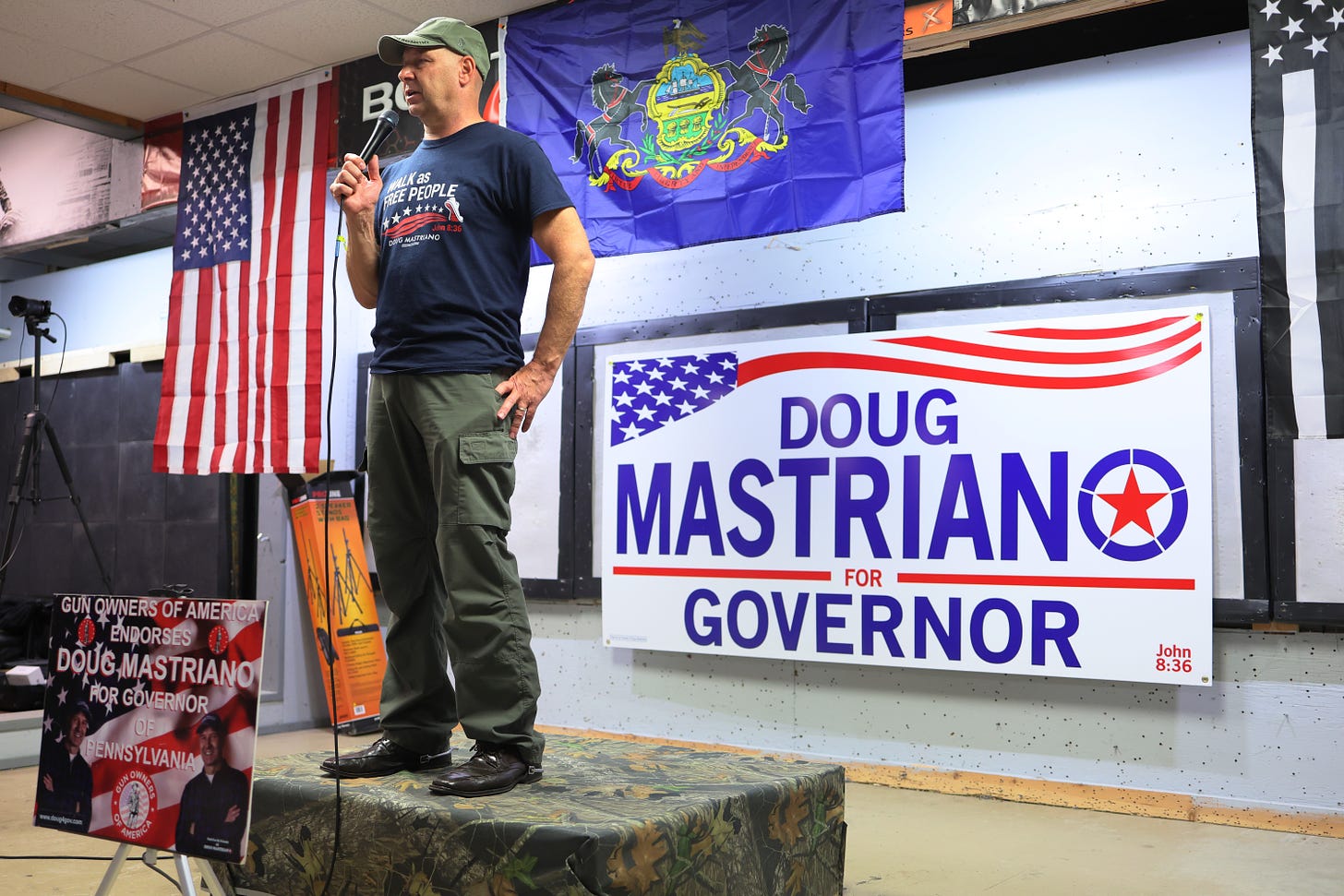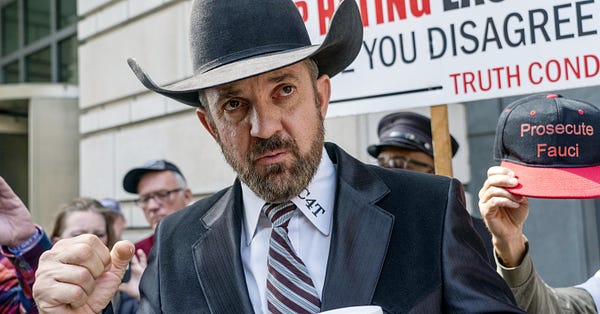
There is nothing past tense about January 6, 2021, even though the date itself is about 18 months ago. The currents that exploded that day are, and will continue to be (with an emphasis on the present and future tenses), a direct threat to the continuation of the United States as a democratic republic.
The congressional committee investigating the insurrection represents not merely a fact-finding exercise to correctly document history, as important as that mission would be. They are firefighters battling a blaze of autocracy and unconstitutional depravity sweeping across the country.
In the hearings this week, the esteemed Michael Luttig, a retired conservative federal judge, starkly concluded that had Donald Trump been successful in his attempts to pressure Vice President Mike Pence to overturn the election, America “would immediately have been plunged into…a revolution within a paralyzing constitutional crisis."
As becomes more and more clear through a cascade of revelations, this was an organized attempt to destroy the United States as a nation based upon the rule of law and the principle that when we hold elections, we honor the results, no matter if our preferred candidate wins or loses. And the pressure on Pence was only part of the plan. It also included attempts to appoint alternative slates of electors in battleground states in direct contradiction of the will of the voters in those states. The goal was to sow confusion, violence in the streets be damned, just as long as Trump could remain in power.
Trump and his confederates — and I choose that word in full recognition of its historical meaning — sought to foment this chaos through the raw exploitation of power and intimidation to nullify Joe Biden’s victory. That a conservative of Judge Luttig’s stature would speak with such unequivocal force, and that it would be echoed by Liz Cheney, Adam Kinzinger, and the Republican staffers on the committee, makes clear that there is a delineation in what they are investigating that is based not on politics but on fidelity to the law and America’s democratic principles.
As the hearings paint a devastating picture of Trump’s plot, there is an emerging Republican talking point that this is all old news. Florida Governor Ron DeSantis, whose ambition to be president is about as naked as a jaybird, called it “beating a dead horse.” It’s an approach that works both to minimize the coup attempt and suggest the Republican Party should move beyond Trump and embrace something new (as in him).

DeSantis’s self-serving protestations, and those of others like him, deliberately obscure the truth. Exposing an attempt to override elections and the will of the voters is not beating a dead horse, unless that horse is American democracy. Promoting the Big Lie as an excuse to nullify Democratic victories has become a mantra for large swaths of the Republican Party.
In his Thursday testimony, Judge Luttig made this chillingly clear. He wasn’t there just to talk about the past; he emphasized that his greatest fears lie in what might come next.

The focus thus far of the January 6 committee has rightfully been on exploring and clarifying the narrative around what happened that day, and specifically President Trump’s role in fomenting the violent coup attempt. But as we can see with the statement above from Judge Luttig, hanging over this entire proceeding is the current danger America faces.
In a front-page article this week, The New York Times analyzed recent election results and concluded something many of you already know: In several battleground states, Republicans have nominated extremist candidates eager to do Trump’s bidding — or that of any Republican leader who wants to dynamite the American political system.


This is of course an American problem, because it threatens our entire constitutional order. But we need to be very clear — this is a cancer that resides firmly within the Republican Party. It has been allowed to linger and grow, and now metastasize. And it is taking root by infecting state and local governance in ways that could very well turn what happened on January 6 into just an opening act.
What makes this so dangerous is that Republican election officials don’t need to actually overturn elections to serve their purpose. They can just cause havoc and chaos, and by doing so undermine the faith the American people have in our democratic systems. We saw a preview of this recently in New Mexico.


It is notable that Congressman Adam Kinzinger, one of two Republicans on the January 6 committee, called it out, along with its implications. Because this movement animates the Republican Party, it is incumbent on all those Republican leaders who eagerly wrap themselves in the mantle of “patriotism” to stamp out this contagion. But what do we hear? Many enthusiastically back these extremists. Others offer tacit endorsements or silence. This is a party that would rather hold on to power than our democracy.
The likes of Bill Barr can call “bullshit” on the Big Lie in sworn depositions, but they should receive no accolades for their forced honesty. Where were their statements at the time? And what are they saying now about the same, pardon again the language, “bullshit” about future elections? Where is Senator Mitch McConnell? Or Vice President Pence? Or the Bushes? Or almost any other Republican of note, past or present?
All who are looking the other way, keeping their heads down, obfuscating, accepting, or outright endorsing this autocracy are willingly gambling with the future of American democracy. Whether it’s born of a desire for power or from cowardice doesn’t matter. Now is a time to stand up and be counted; almost every Republican leader is failing the test.
So what are the rest of us to do? Hopelessness and despair are not options. First and foremost, this should be a major issue on everyone’s radar. And I think the January 6 committee will help with that. But all citizens have a role to play. Getting out to vote for those who would protect democracy and encouraging others to do so is essential. This is not a matter of policy. This is about the basic mechanisms of democracy. Do we respect our elections? Do we count the votes and declare those who won the most to be the winner?
As with issues like abortion and guns, I think a large majority of Americans want our basic democratic system to continue. They might even want reforms to make it fairer. And this points to another approach to countering those who would attack our system. We can shame them, call out their playbook now, let them know that we see what they will attempt to do, and declare their “voter fraud” propaganda what it is — a farce and a lie. Put all Republican officials on the record.
In the lead-up to the war in Ukraine, the United States did a masterful job of preempting Russian propaganda. We let the world know what the Russians would do and the lies they would use to justify it. We can use the same approach toward those lining up to attack our democracy. We see them. We know their tactics. They aren’t trying to hide them. There can be no “false equivalence” allowed around this matter, in the media or in the public at large.
What these would-be autocrats are saying is they want a system that is essentially, if I win, I win, if you win, I win. They claim fraud only when Democrats win the vote. They claim a vice president can overthrow an election only when a Republican is vice president. This isn’t a matter of politics. It’s a matter of democracy. The stakes aren’t between Republicans and Democrats. All Republicans who understand this, the Judge Luttigs, the Liz Cheneys, the Adam Kinzingers, and any who join the ranks now, should be welcomed and encouraged.
The dividing line is pretty simple, and I believe the vast majority of Americans fall on one side. This is about who believes in the health and security of the United States, our Constitution, and our rule of law, and who does not.


- coup d'etat:
"sudden, decisive exercise of power whereby the existing
government is subverted without the consent of the people;
an unexpected measure of state, more or less violent; a
stroke of policy."
I did not vote for Donald Trump or Joe Biden.
I am not a member of the Republican Party or the Democratic Party.
I have no allegiances to any of the above mentioned, and I have never been paid to write a political opinion. I have no corporate interest to stroke and everything I write here reflects my genuine concern for the nation that we all call home.
There was an organized attempt to usurp the rule of law and election integrity but Mr. Rather didn't address it at all and he demonstrates a facile take on the subject that is not worthy of someone with his professional experience.
I wrote a point for point assessment to give you an idea of where I was coming from but as I was writing it I realized that it misses the real issue entirely. Distractions are indeed a useful weapon of political warfare.
Elections are to be administered in a way that is unassailable, that is to say that there isn't anything anyone can say or do after the fact to call it into question. Elections give authority to human individuals---human individuals with personal interests, some conflicting with public interest. Some of these people are willing to cheat to advance those interests. We have over the years devised safeguards to protect our elections. We have a documented history of their success.
Perhaps you are fortunate enough to live in a state that handled its elections well and perhaps your preferred candidate won. But there will be be more elections and your candidate will not always win. Now is the time to hear your fellow citizens grievances and put in the extra effort to come to resolution. I can tell you with apodictic certainty that my state did *not* administer a certifiable election---and that means your vote matters less than you think. It also means that the presidential election was a fraud. I didn't pay much attention to Stacey Abrams when she claimed she was defrauded and I now regret not looking into it because we could have prevented this. Don't make the same mistake as me; it's alot harder to restore than you think.
There is nothing past tense about January 6, 2021, and there /shouldn't/ be. The past tense is reserved for events with conclusion, especially those with resolution. While we can be certain that the sun set that night and rose again the next morning and that it is no longer the sixth day of the first month of 2021, sunlight has barely touched this event. Conclusions and resolutions seem far away on this matter.
Is the congressional committee a fact-finding exercise at all? It has surely found facts, but any investigator would probably agree that precluding a set of facts that do not advance the investigator's desired outcome and fabricating facts to advance the same is an exercise not worthy of the job description of investigator. And firefighters don't light fires to fight fires unless they have lost control of the blaze and need to let a portion burn.
1. The threat to our democratic republic is /why/ the event happened not the result of it.. It isn't the cartoonish cult of personality of Donald Trump, either. Thousands of people (possibly millions) traveled to Washington D.C. that day with a purpose. I've spoken with hundreds of them (including a few that broke the law) and not a single one of them wants to "destroy the ... rule of law" nor do they want their personal preference to usurp election integrity---to the contrary, in fact. It is an obscenely disingenuous and absurdly inaccurate assertion (ignorant, at best) yet that is Mr. Rather's implication.
2. There is quite a bit of controversy regarding the last presidential election. That much isn't controversial. To pretend otherwise is also obscenely disingenuous and absurdly inaccurate (ignorant at best). You do not resolve controversy by gaslighting those with opposing views. You can start wars that way, however.
3. Mr. Rather doesn't know the "will of the voters" in the battleground states (certainly not better than the state legislatures, who appointed the alternative slates in according with their law). He says the goal was to "sow confusion, violence in the streets be damned, just as long as Trump could remain in power" without any evidence to support. This is pure conjecture and is not helpful. The will of many voters drove them across country to Washington, D.C.
4. "Trump and his confederates" --- Here, Mr. Rather demonstrates his contempt and bias explicitly, even noting the historical context.
5. Again, Mr. Rather pretends to know the innermost desires of Trump and unnamed confederates hearts and their implementation by vague "power and intimidation".
6. The talking point /du jour/ regarding Luttig appears to cast Luttig as an esteemed retired conservative judge. His testimony is relevant only insofar as to the advice he gave Mike Pence.
a) Judges are "esteemed" /de facto/.
b) He has been noted for having anti-conservative judicial opinions.
c) Luttig left his civic duty as a federal appellate judge because Boeing offered him more money. He's a retired corporate lawyer / Vice President of Boeing.
7. Liz Cheney and Adam Kinzinger echoing the sentiments of the Democratic Party and the Never Trumpers are hardly indicative of any fidelity to the law and democratic principles---to the contrary, it indicates politics in spite of those things.
8. Taking issue with the 2020 presidential election can in no way be construed as an extremist position. Speaking of minority political opponents as "cancer" could easily be seen as an extremist position.
9. Mr. Rather seems to think that everyone trusts what politicians say yet I don't know anyone that does. What undermined the faith the American people had in our democratic systems were the people running the democratic system. Their demise is unavoidable.
10. The Dominion voting system is not trustworthy (see /Curling v Raffensperger/). And that was /before/ the election. So all of this could have and should have been avoided.
11. How ironic of Kinzinger (whose name is mud by anyone to the right of Nancy Pelosi) to say that the Republican Party (the /minority/ that he is a member of) would rather hold on to power than our democracy. What power?!
12. "Autocracy"
Professional journalists should have a better command of the English language. What autocracy?
13. "Do we count the votes and declare those who won the most to be the winner?"
That's precisely the problem...we don't but /we should/ and /we will/.
14. Election integrity is not a partisan issue. It's an easy litmus test for separating the wheat from the chaff on democratic values. Mr. Rather appears to be a partisan here and uses "democracy" as a euphemism for the Democratic Party.
15. What is a would-be autocrat? Nobody said "If I win, I win, if you win, I win." Nobody even implied that. Nobody.
Thank you!